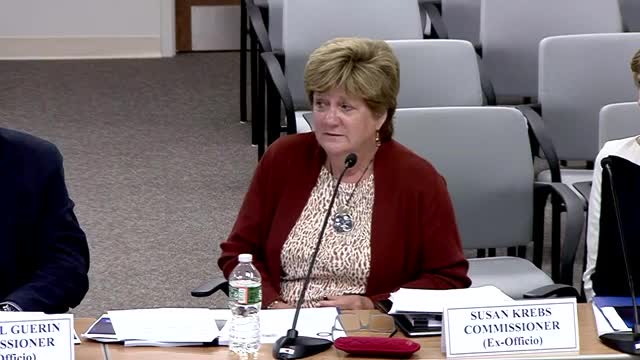District updates on roofs, tracks, geothermal pilots and backlog: county staff report maintenance cycle and energy savings
September 26, 2025 | Carroll County, Maryland
This article was created by AI summarizing key points discussed. AI makes mistakes, so for full details and context, please refer to the video of the full meeting. Please report any errors so we can fix them. Report an error »

County and school facilities staff updated boards on a range of maintenance and energy items: paving and roofing cycles, track repairs, and geothermal heating and cooling installations.
Staff said most failed paving conditions have been addressed and the district is now cycling paving to coordinate with construction work so new paving is not damaged by heavy equipment. The roofing program is nearing completion of older single‑ply roofs; staff said finishing the last single‑ply systems (Century and others) is near the end of the current multi‑year cycle.
On track surfaces, staff said Liberty’s track received repairs over the past summer and that tracks across the system follow a roughly 10-year replacement/repair cycle. Facilities staff said tracks are on an established maintenance schedule.
Geothermal: staff described previous geothermal installations as having higher first‑costs because of drilling and ground loops but returning energy savings and operational benefits in the mid-term. Staff reported estimated energy efficiencies in the 20–30% range on completed geothermal projects and an estimated payback window of roughly four to eight years at the time of last analysis; staff noted actual payback will vary by site and energy prices. The geothermal systems use distributed heat pumps that provide redundancy (a failed compressor affects a classroom rather than an entire school chiller) and can improve comfort and zoned control.
Facilities leadership said the district has no dedicated energy manager position currently but is evaluating future projects, including geothermal for Northwest Middle. Staff also said prior installations by county recreation and parks helped streamline procurement and product testing in recent projects.
Ending: officials described these items as part of a larger facilities plan that prioritizes modernization versus system repairs depending on funding. They advised boards that escalating statewide construction costs and relatively flat state CIP funding make project prioritization critical.
Staff said most failed paving conditions have been addressed and the district is now cycling paving to coordinate with construction work so new paving is not damaged by heavy equipment. The roofing program is nearing completion of older single‑ply roofs; staff said finishing the last single‑ply systems (Century and others) is near the end of the current multi‑year cycle.
On track surfaces, staff said Liberty’s track received repairs over the past summer and that tracks across the system follow a roughly 10-year replacement/repair cycle. Facilities staff said tracks are on an established maintenance schedule.
Geothermal: staff described previous geothermal installations as having higher first‑costs because of drilling and ground loops but returning energy savings and operational benefits in the mid-term. Staff reported estimated energy efficiencies in the 20–30% range on completed geothermal projects and an estimated payback window of roughly four to eight years at the time of last analysis; staff noted actual payback will vary by site and energy prices. The geothermal systems use distributed heat pumps that provide redundancy (a failed compressor affects a classroom rather than an entire school chiller) and can improve comfort and zoned control.
Facilities leadership said the district has no dedicated energy manager position currently but is evaluating future projects, including geothermal for Northwest Middle. Staff also said prior installations by county recreation and parks helped streamline procurement and product testing in recent projects.
Ending: officials described these items as part of a larger facilities plan that prioritizes modernization versus system repairs depending on funding. They advised boards that escalating statewide construction costs and relatively flat state CIP funding make project prioritization critical.
View full meeting
This article is based on a recent meeting—watch the full video and explore the complete transcript for deeper insights into the discussion.
View full meeting
